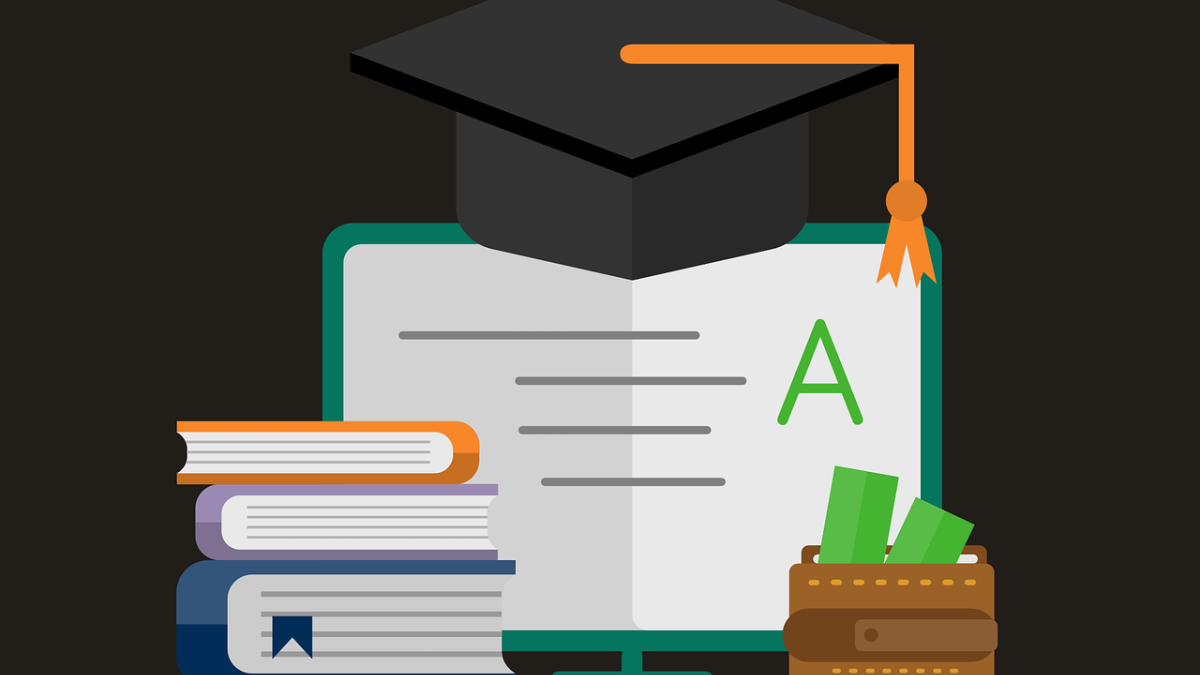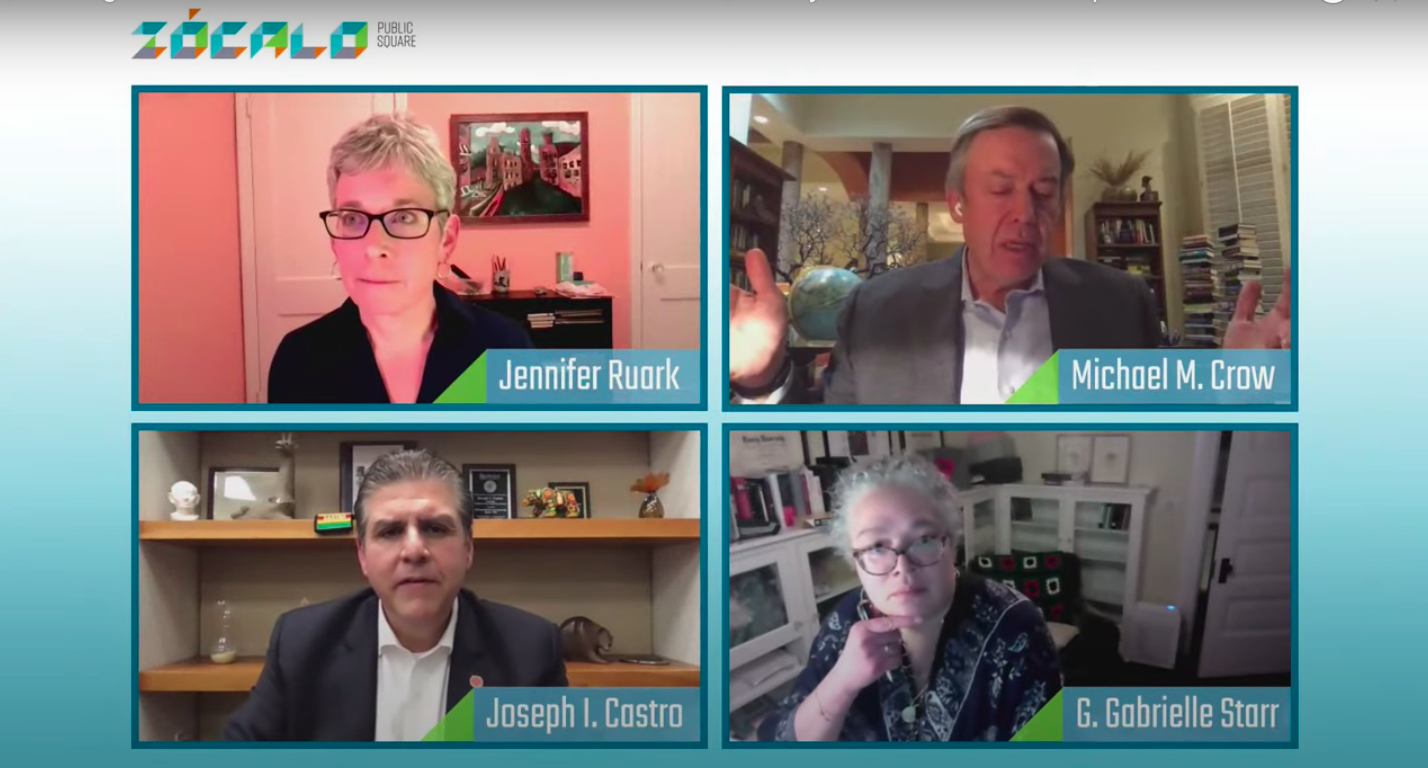Rising college costs, skyrocketing student debt and increasingly out-of-touch curricula are leading more Americans to question the fairness and value of higher education. What needs to change in order to transform American higher education into a stronger force for equity and innovation?
Zócalo Public Square, an Arizona State University Knowledge Enterprise, recently brought together leaders in the higher education space to discuss the top issues facing American higher education and the sector’s legitimacy crisis. During a candid conversation with Jennifer Ruark, deputy managing editor at “The Chronicle of Higher Education,” college and university leaders reflected on steps they think the sector should take to better serve as engines for social mobility.
ASU President Michael Crow said that at the core of many of the sector’s problems is a lack of communication by higher education institutions with the broader communities that institutions serve.
“We — the colleges and universities — have done a poor job of staying connected to everyone but our students,” Crow said. “What I mean by that is that we have done an outstanding job with those that come and graduate and move forward, and they’ve added much and contributed much. But I think that we’re doing a poor job at staying connected beyond that.”
On Jan. 14, 2021, during a virtual event hosted by Zócalo, ASU President Michael Crow discusses the need to transform higher education to fulfill the needs of the communities universities and colleges serve.
As public goods, higher education institutions perform many functions beyond their core educational missions, and are intended to serve society by providing philanthropic contributions to the community, educating the future workforce, and conducting essential research in industries such as medicine and technology.
“At first blush, education might seem like such a private good,” said Pomona College President Gabrielle Starr. “That it’s only for you. But that isn’t true. Take the tragedy of Flint, Michigan, and the poisoning of the community’s water. Without higher education and the kinds of research and teaching that we do, there would be more children poisoned. Simple as that. I think we need to tell the truth more about what we can do, and we need to do it together.”
While the sector could benefit from coordinated communication about its social impact, institutions must also confront widespread problems that are largely of the sector’s making, particularly related to equity and access.
At the core of these hierarchy and equity issues is an exaggerated narrative of scarcity among higher education institutions.
“There are in fact enough seats in American higher education for every student who is qualified,” Starr said.
California State University Chancellor Joseph Castro echoed concerns about a false sense of scarcity.
“I do think there is a place for students who want access to higher education,” Castro said. “We just need to work together to ensure that those students who are place-bound, like the ones I used to serve in the Central Valley, that they have a place to go.”
“Our job is to try and make sure that everyone that wants to move forward with their life and obtain a college-level education has the opportunity to do that without barrier,” Crow said. “I think what’s happened, however, is that this idea of scarcity has infected everything. You get these social hierarchies. One of the things we have messed up in higher education is that we have allowed ourselves to be socially hierarchically structured in a ranked system of status-granting. That is deeply and negatively impacting our society and it affects everything, and we’ve got to figure out how to fix that.”
When asked if he could wave a magic wand and change one thing about higher education, Crow said that he would change how institutions are ranked and the criteria used to evaluate them.
“No more rankings based on inputs,” Crow said. “Changing the criteria used by these rankings would lead to massive changes in terms of where institutions place their priorities.”
Founded in Los Angeles in 2003, Zócalo Public Square is an ASU Knowledge Enterprise that publishes ideas journalism and convenes events. The ASU Knowledge Enterprise trains and supports entrepreneurs, leads the university's economic development activities, engages with corporate partners and international development agencies, and facilitates technology transfer.
Top photo courtesy of Pixabay.com.
More Arts, humanities and education

ASU alumna makes her way back to the ASU Gammage stage for '¡azúcar!'
As the Los Angeles-based CONTRA-TIEMPO dance group prepares for its upcoming production “¡azúcar!” at ASU Gammage, for one member of the dance group it is also a nostalgic return to her home.Born in…

ASU FIDM professor wins international award for fantastical, sustainable creation
The horror of an ailing Earth inspired an Arizona State University fashion professor to create a fantastical garment out of sustainable, re-used and found materials that won a prestigious…

ASU workshop trains educators, professionals from marginalized communities in disaster science
As devastating as hurricanes can be to anyone caught in their paths, they strike marginalized communities even harder.To address this issue, a fund named for a former Arizona State University…

